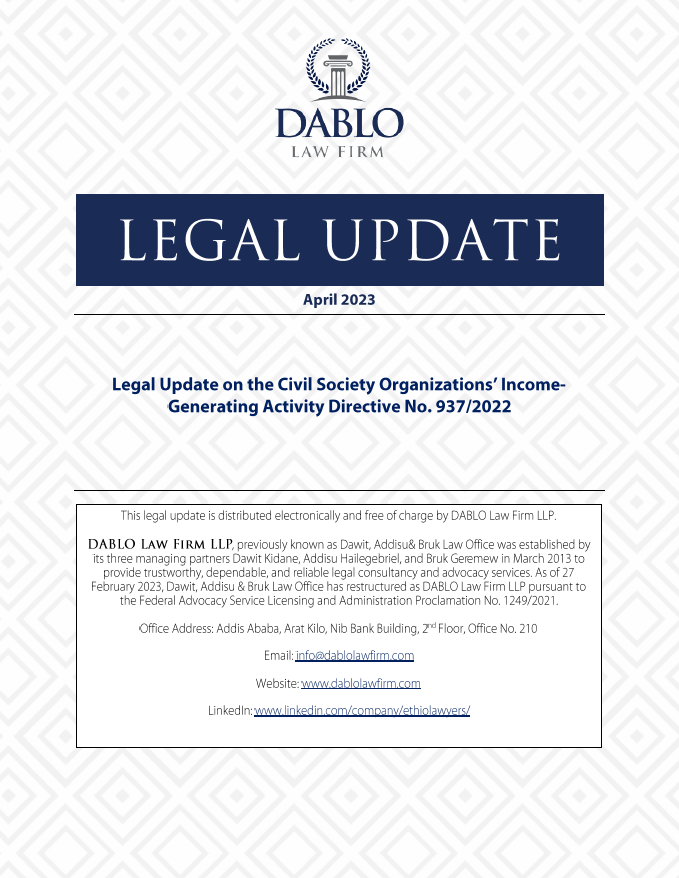Legal Update- Civil Society Organizations’ Income-Generating Activity Directive No. 937/2022
Civil Society Organizations (CSOs) undertake their activities primarily from the donations they receive from domestic/foreign organizations and individuals. But donation is not reliable and donated funds may not always be sufficient to carry out their objectives. Thus, it is crucial to create an enabling environment for CSOs to engage in Income Generating Activities (IGAs).
To this end, Organizations of Civil Societies Proclamation No.1113/2019 allows CSOs to engage in IGAs so long as the income that is generated is used to cover the administrative and program costs of the CSOs. Doing business is one form of permissible IGA.
CSOs have a right to engage in any lawful business and investment activity in accordance with the relevant trade and investment laws. The Authority for Civil Society Organizations (ACSO) has issued the Civil Society Organizations Income-Generating Activity Directive No. 937/2022 which regulates CSOs’ involvement in business. This legal update briefly unpacks the entry, dissolution, and precautions CSOs should take when doing business.
Entry: A CSO may establish an independent business organization, either solely or together with other CSOs, in accordance with the Commercial Code and commercial registration and licensing laws. The business organization could be one of the types of business specified under the Commercial Code of Ethiopia. The decision regarding the formation of a business could be made through the bylaw of a CSO, a decision passed by the governing body of a CSO, or by a body authorized by the CSO’s bylaw. A CSO may also engage in business by buying shares in an existing business established by another CSO or from any other business.
The initial capital of the established business may be paid from a program subject to the requirements set by donor organizations regarding the use of donated funds, money borrowed from a bank, or other sources. The capital shall be allocated as a program or project cost, and it shall not be more than 30% of the total budget allocated for carrying out its objectives.
To engage in business, CSOs are not required to secure the approval of the ACSO beforehand. However, a CSO that is involved in a business has a duty to notify the ACSO within fifteen working days of the business commencing operations. Similarly, a CSO that has purchased shares must notify the ACSO about the purchase of shares within fifteen days.
Dissolution: If a CSO that has established a business organization is to be dissolved, the established business should be dissolved as well, and its accounts shall be audited according to Ethiopia’s commercial law. After the creditors’ debts are paid and the accounts are cleared, the remaining property and money shall be transferred to another CSO as determined in advance by the organization’s bylaws or by the decision of the supreme body of the CSO or the body authorized by the bylaws. If there is no predetermined CSO, the ACSO shall receive the remaining property and money. The ACSO may transfer the received assets to other CSOs or place them in the civil society fund. However, if the continuation of the business is deemed necessary, the established business organization may be transferred to another CSO.
Cautions:
- The name of a business established by a CSO must be different from the name of the business organization it establishes.
- The service/goods provided by the business should take into consideration the disabled and community members who need special support.
- Profits from the business should be fully used to cover the program or administrative expenses of the CSO.
- A CSO must ensure that the debt incurred by the business does not hinder or contradict the purpose of the organization.
- When appointing a member of the management of a CSO as a member of the board of directors of a business organization, it should be ensured that the activities of the CSO will not be disrupted.
- The use of assets and resources by the CSO and the business should not be mixed in any way.
Organizations Previously Engaged in Income-Generating Activities: CSOs that have already engaged in income-generating activities prior to the issuance of the Directive are required to reorganize their income-generating companies (entities) in conformity with the Directive.
Penalty: Failure to adhere to the provisions of the Directive entails penalties ranging from a written warning to the dissolution of the business company.
Disclaimer: The views and opinions expressed do not reflect the official policy or position of DABLO. The writing is not intended to be, and should not be used as, a substitute for taking legal advice in any specific situation.
©2023 DABLO Law Firm LLP







